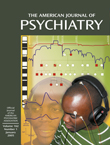Dr. Lespérance and Colleagues Reply
To the Editor: The interesting letter from Dr. Lyness et al. informs us of a study they carried out that paralleled our results in finding no association between an inflammatory marker, interleukin-1β, and depression in a group of cardiac patients. However, that study included only 27 subjects, and only four had a current major depression, making the meaning of a lack of relationship between depression and this inflammatory marker unclear. In addition, interleukin-1β is not the same as interleukin-6, which is the cytokine that has been found to predict cardiac events.
We agree with Dr. Lyness et al. that we may not have been able to find an association between interleukin-6 and depression because of the timing of our assessment. We interviewed our subjects approximately 2 months after hospitalization for an acute coronary syndrome. Because the release of interleukin-6 is more dynamic and short term than the release of soluble intercellular adhesion molecule 1 and C-reactive protein, it is conceivable that we missed the peak of the increase in interleukin-6 associated with the acute coronary artery events. Although we could hypothesize that this peak may have been greater among the depressed subjects, by 2 months after the event, it was no longer apparent in our study.
Dr. Lyness et al. are also correct in suggesting that inflammatory markers are likely to correlate with other measures of the severity of cardiac disease that reflect atherosclerotic processes. For example, in our study, interleukin-6 was significantly correlated (all p<0.05) with age; previous myocardial infarction, bypass surgery, or angioplasty; coronary bypass surgery at index; abdominal obesity; high body mass index; low high-density lipoprotein; high blood pressure; high fasting glucose level; high fasting insulin level; and the presence of metabolic syndrome. However, even after statistical control for these potential confounders, there was still no association between depression and interleukin-6 levels in our group.



